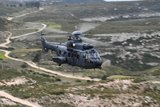DefExpo 2020: Indian air worthiness changes promise disarray for military
India’s new military projects such as trainers, transporters and fighters, as well as upgrade programmes, could face disruption following a recent directive by the Bengaluru-based Centre for Military Airworthiness and Certification (CEMILAC) to stop issuance of design house approvals and renewals.
This will affect companies such as HAL and Bharat Electronics.
Starting immediately, the enlistment of contractors is closed and, only once a company is declared the lowest bidder, will a CEMILAC certification audit be carried out.
An-32s, for instance, require upgraded cockpits, but ‘we may find TV companies bidding!’ complained one military engineer.
The move has shocked professionals. As
Already have an account? Log in
Want to keep reading this article?
More from Air Warfare
-
![L3Harris begins work on South Korean AEW&C aircraft, eyes further international opportunities]()
L3Harris begins work on South Korean AEW&C aircraft, eyes further international opportunities
The company remains upbeat about its Indo-Pacific and European prospects, with its AERIS X system onboard a Bombardier 6500 proving an attractive option for air forces’ growing AEW&C needs.
-
![Saudi Arabia air report: The world’s fourth-largest UAV market seeks to strengthen domestic industry]()
Saudi Arabia air report: The world’s fourth-largest UAV market seeks to strengthen domestic industry
With $9.18 billion in uncontracted programmes — including a potential multi-billion-dollar MQ-9B deal — Saudi Arabia’s UAV sector is poised for significant further growth and industrial expansion.
-
![AI mission-autonomy software integration and partnerships see progress across CCA efforts]()
AI mission-autonomy software integration and partnerships see progress across CCA efforts
The successful integration of third-party mission autonomy in the US Air Force’s CCA programme and movement on Helsing’s Europa CA-1 timelines mark key milestones in the development of uncrewed aerial capabilities.
-
![World Defense Show 2026: Airbus details A400M upgrade as second Indonesia aircraft delivery looms]()
World Defense Show 2026: Airbus details A400M upgrade as second Indonesia aircraft delivery looms
With the A400M set for a capability upgrade, Airbus officials are bullish about the aircraft and its market potential for both new and existing customers with the improvements geared towards meeting future requirements.






















